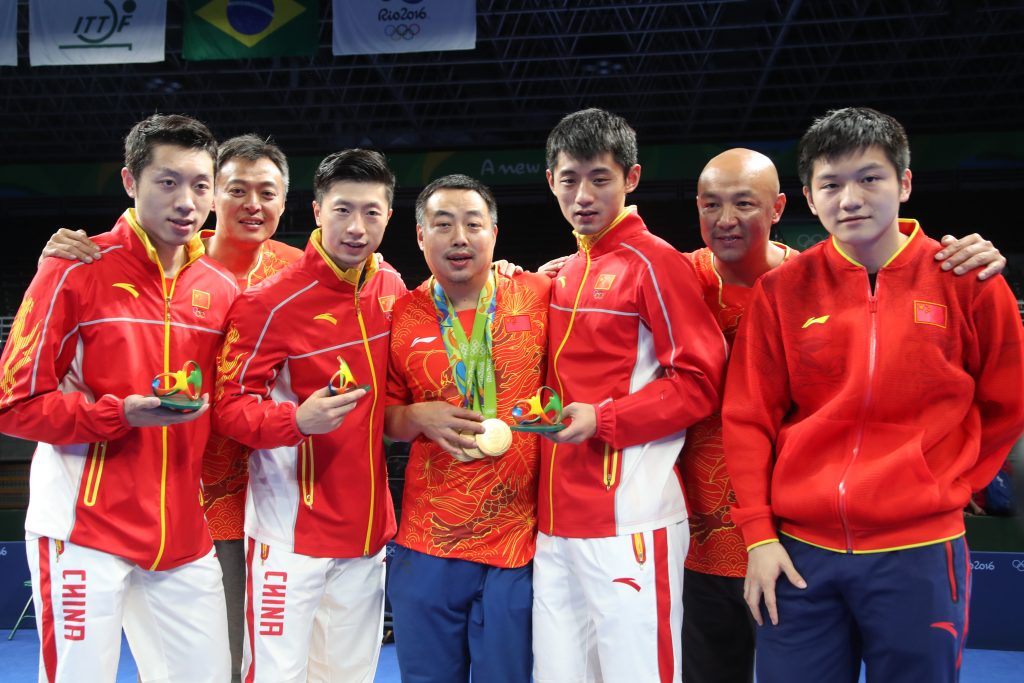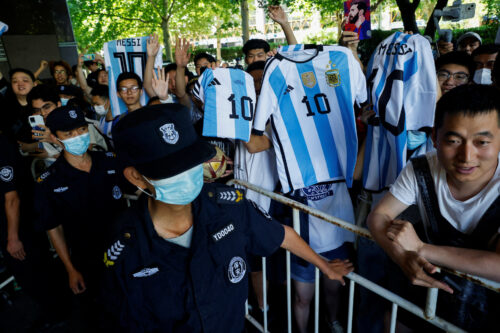Why are China’s top table tennis players protesting?
A tale of Ping-Pong politicking in the People’s Republic.

On June 23, 2003, Liu Guoliang 刘国梁, at the age of 27, was appointed as the head coach of the Chinese men’s national table tennis team. It was unusual for a Chinese athlete who was under 30 to take the helm of a national team, but Liu has a distinguished record that earned him the position. As the first Chinese player to claim a career grand slam of Olympic Gold, World Cup, and World Championships, Liu is a legend of Chinese Ping-Pong.
A Ping-Pong protest
Fourteen years later, on June 23, 2017, Liu once again made a name for himself, but this time not in a way that he intended. During the 2017 ITTF World Tour China Open in Chengdu, three of his students, Ma Long 马龙, Fan Zhendong 樊振东, and Xu Xin 许昕, who also happen to be the top three table tennis players in the world, didn’t show up for their second round of singles matches in an apparent protest over a recent personnel shuffle within the national team, which removed Liu, their esteemed coach, from his current position.
“At this moment, we don’t feel like playing anymore…all because we miss you, Liu Guoliang,” wrote the three athletes on their Weibo accounts simultaneously at 7 p.m., 40 minutes before the matches began, along with the same caricature of Liu and a photo of themselves with the coach.
The trio’s scheduled opponents, two Japanese players and one Korean player, were awarded walkover wins due to their absence. But the spectators in the studium, mostly Chinese table tennis fans, seemed less furious about the team’s unexpected defeat than about Liu’s removal, as a video shows that the crowd kept chanting the name of Liu even after the games terminated.
On the night of the sudden withdrawal, as the affair started to gather attention outside the Ping-Pong circle, the General Administration of Sports of China quickly weighed in by releasing a statement (in Chinese) condemning the behavior. “The act of forfeiting without permission and leaving without notice in such a major international tournament showed that they had no respect for the athletic code of conduct, nor for the national interests and glory,” said the spokesman in the statement, adding that the incident would be dealt with “in an extremely serious manner.”
The Chinese Table Tennis Association (CTTA) followed up the next day with another statement (in Chinese) that, to many people’s surprise, did not properly address the withdrawal, but spent a considerable chunk of its length explaining the recent reshuffle in the Chinese National Table Tennis Team. According to the statement, the removal of Liu is part of a reform of the team’s management, which was triggered by an investigation into a lawsuit involving Kong Linghui 孔令辉, who was suspended on May 29 from his duties as the head coach of the national women’s team because he was found to have gambling debts.
“The probe into Kong’s case discovered various deep-seated problems in the management of the national team,” the statement says. “In order to effectively strengthen the team structure, reduce the level of management hierarchy, and improve the efficiency of the preparation for Olympic Games, the CTTA had decided to remove the positions of overall head coach and the men’s and women’s team head coaches. Instead, two separate coaching teams have been set up for men and women players.” In regards to Liu’s removal, the CTTA said that the former head coach had been named as a vice president of the CTTA, which would allow him to contribute more to the organization “on a higher platform.”
Implicitly, the CTTA’s announcement confirmed a concern that had been shared among the inner circle of Ping-Pong fans for a period of time. The national table tennis team is undergoing a drastic reformation, and Liu’s removal and the ensuing buzz is just bringing all the behind-the-scenes drama into the spotlight.
Sports reform
On its surface, the reform seems a good move — cleaning up the CTTA should be good for players, and good for Liu. Just as the CTTA implied in its statement, Liu seemed to be granted more power after the promotion.
But what the statement failed to explain is the timing. Normally speaking, structural reforms rarely happen in the good years. And for Chinese table tennis, the past few years were a massive success. At the Rio 2016 Olympics, the traditional powerhouse in Ping-Pong continued to rule the roost by winning all four gold medals available, marking its fifth clean sweep in the last six Olympic Games. As of June 2017, China claimed the top four positions in the world ranking of men’s singles and top three of women’s singles, leaving other countries slim hopes of winning medals in any upcoming international competitions. At the “China Top 10 Benefiting Laureus Sports for Good Awards” held in December 2016, the men’s team was awarded the three most important titles of 2016. Ma Long, the current best male Ping-Pong player on earth, was crowned the Male Athlete of the Year. Zhang Jike, though he lost to Ma in the men’s singles final at Rio 2016, picked up the Most Popular Male Athlete of the Year because of his unparalleled popularity among Chinese Ping-Pong lovers. In addition to the two athletes, Liu, the former star coach, claimed a special Outstanding Achievement Award.
Meanwhile, step by step, Chinese table tennis has been realizing its commercial potential. Athletes like Ma and Zhang have become engaged on social media and reality shows, in an effort to transform themselves into celebrities, rather than just professional players who only garner attention once every four years at the Olympics. Businessmen have started to tap into the potential of the sport, as table tennis is no longer perceived as “uncool” in China and has huge youth appeal.
By any measure, the national table tennis team is now at the peak of its success. So doubts surrounding the reform have begun to mount.
Gou Zhongwen and the Soviet legacy in sports
Gou Zhongwen 苟仲文 is the driving force behind the reforms. Since he took office as the new director of the State General Administration of Sports in November 2016, he’s been extremely active in introducing reforms in various fronts of Chinese sports, despite the fact that he has little experience in sports administration. Under his leadership, the Chinese Football Association (CFA) enacted the strongest policies ever to curb hiring of foreign players and support local youth athletes. The new regulations require all top-tier and second division clubs, starting from the 2018 season, to file the same number of local under-23 players as foreign players in each game, which was widely criticized (in Chinese) by Chinese football fans as an ill-conceived plan to “politicize” Chinese professional football leagues and clubs.
In fact, Gou has never been shy about laying out his ambitions in public. During this year’s Two Sessions, Gou pointed out (in Chinese) that the biggest challenges facing Chinese sports are systemic. “We have no alternative except to embrace reforms. Reform will be the theme of Chinese sports in the future,” Gou said, adding that the “whole nation system,” a legacy from the Soviet era that emphasizes the government’s role in regulating athletes, still remained an integral part of Chinese sports.
Gou has ruled with an iron fist, yet he received little appreciation because he has continued to push his policies to higher levels of absurdity. For example, in regards to the nation’s weak performance in the Winter Olympics, Gou proposed that field hockey players should be retrained to play ice hockey, and shooters should take up biathlon, a Winter Olympic sports that combines rifle shooting and cross-country skiing.
Guo’s aggressive leadership style met with little resistance until, almost nine months into his new position, he set his sights on table tennis. As an outsider, Gou wanted to leave his mark on Chinese Ping-Pong history by pushing the reform, which would bring more outsiders into the system to manage the national team, rather than coach it. It’s no wonder that the three athletes, Ma, Fan, and Xu, risked their careers to protest the reform that will very likely destroy the factors that make Chinese table tennis so outstanding, among which first and foremost is the deep affection and mutual trust between athletes and their beloved coaches.






